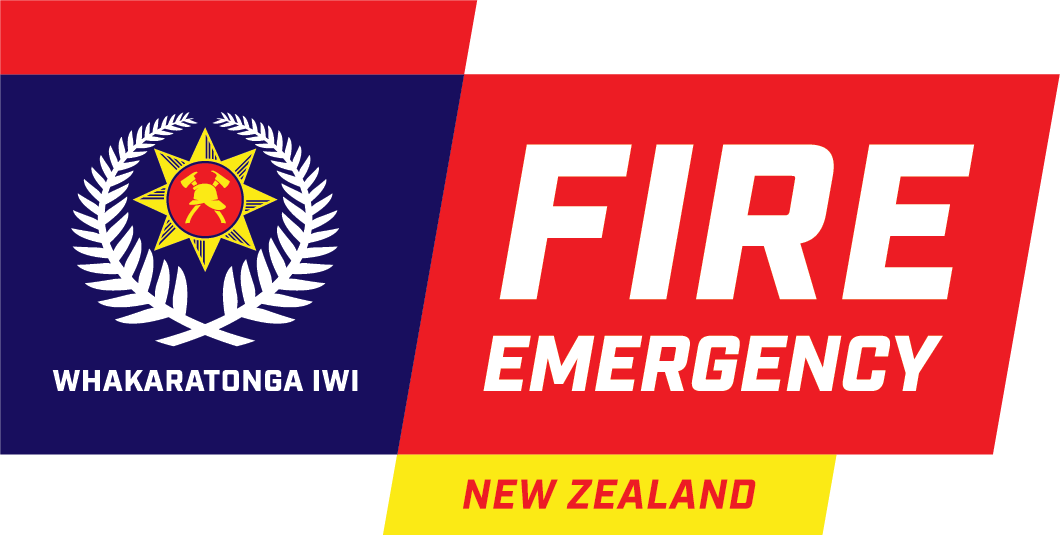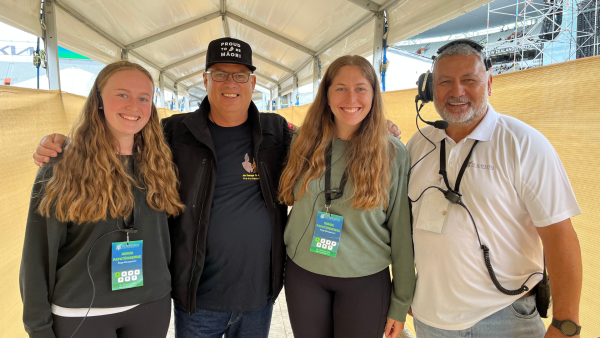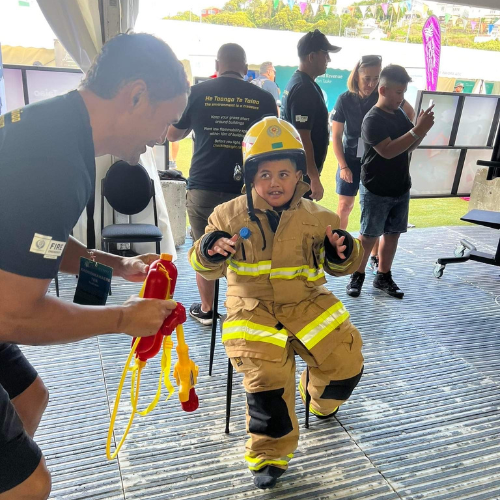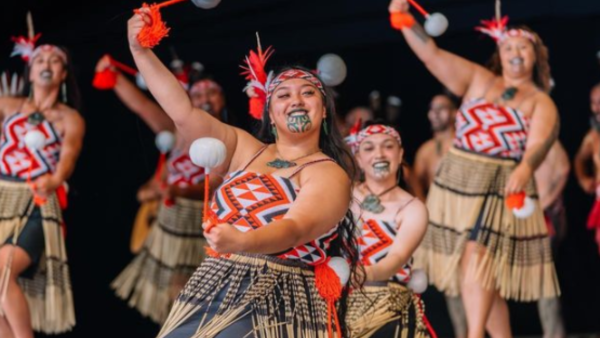Our people involved at Te Matatini the “Olympics of kapa haka”
*Definitions for te reo Māori words in green can be found in the glossary at the bottom.
The Festival
What do 1.1million worldwide viewers, 60 thousand attendees and over 1,500 performers have in common? They all came together in February to celebrate the passion, intensity and sweet harmonies of Te Matatini national kapa haka festival, the pinnacle event for Māori performing arts in the world.
Te Matatini has been described as the “Olympics of kapa haka” and is the most highly anticipated four days in the calendar for both performers and the mass of passionate fans throughout the world.
 |
 |
 |
After a four-year hiatus due to COVID-19, the festival was hosted by Ngāti Whātua Ōrākei at Eden Park in Tāmaki Makaurau. 45 kapa from across the motu took the stage with the intent to captivate, impress and move judges and audiences alike in the hopes of progressing to the finals to win the supreme title of “Toa Whakaihuwaka”.
From backstage management, to exhibitors in the marketplace to performers on-stage, Fire and Emergency’s people were involved in many parts of the festival.
ELT behind the scenes
For our Kaupapa Māori and Cultural Communities DCE, Piki Thomas this was his 10th year volunteering to manage the backstage with his team of festival volunteers. While their mahi is invisible to the audience, you’d know if they weren’t there!
With 600 kaihaka making up 15 live streamed performances each day, Piki and his team are vital in ensuring everything behind and on the stage runs like clockwork. Piki found some time to take Chief Executive Kerry Gregory on a tour behind the scenes along with festival volunteers; Kaitlyn and Jen Marsh.
 |
|
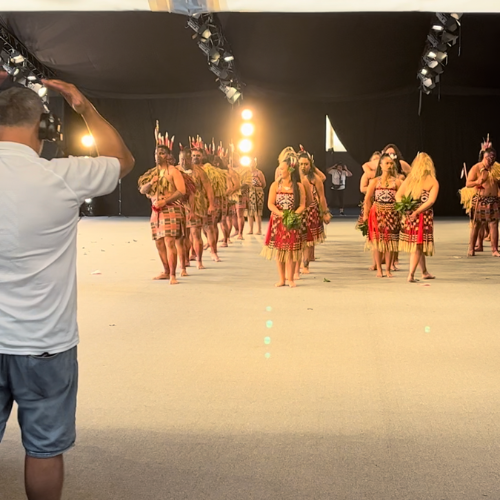 |
The Market Place
Alongside the performance venue is the ‘Market Place’ which engaged attendees during the breaks. Fire and Emergency kaimahi representing each of our regions worked alongside Te Rōpū to operate a busy and energetic stall connecting with attendees on escape planning, home and marae fire safety and recruitment.
Kerry Gregory and Region Manager for Te Hiku Ron Devlin visited our kaimahi and both commented that after the challenging week from Cyclone Gabrielle the energy and whakawhanaungatanga, togetherness of being there was extremely uplifting.
|
|
|
|
Dedication to performing
Blane Wainohu is a Firefighter for Nuhaka Volunteer Fire Brigade and performed in the competition with Mātangirau, a Wairoa based kapa. Cyclone Gabrielle caused widespread devastation to the Wairoa rohe and there was much speculation as to whether the kapa would make it to the competition.
Power cuts and road closures were just a few of the challenges the kapa overcame, and when they took to the stage on the second day of the competition, they portrayed a powerful image of mud imprinted on their legs. The audience were moved not only by the symbolism representing the state of their homes and marae but also their dedication to performing.
|
|
|
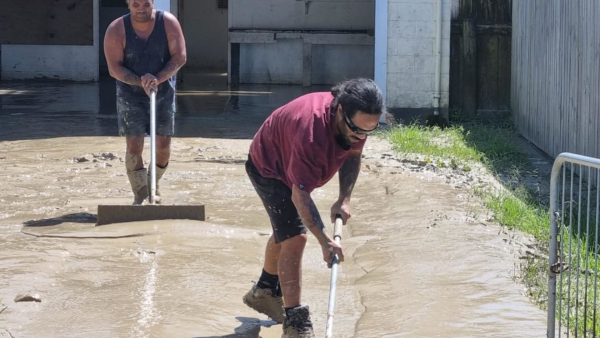 |
Kōrero with Kaihaka, Hōri Mana
Another performer from Fire and Emergency was our Pou Takawaenga Māori | Māori Liaison Officer for Te Ūpoko, Hōri Mana.
40 kaihaka make up each group and are a mix of seasoned professionals and first-time performers. For Hōri, this was his 5th time taking the stage, since his debut at Te Matatini in Te Tairāwhiti, Gisborne in 2011. Hōri performed with ‘Te Tini o Rēhua’ a group who welcome people of all hapū and iwi affiliations to be a part of their kapa. They were established to provide an opportunity to educate people in Māori culture and knowledge using haka as the platform.
To make it to Te Matatini Te Tini o Rēhua had already competed and won at one of 13 regional kapa haka competitions out of a total pool of 163 teams.
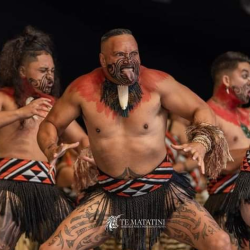 |
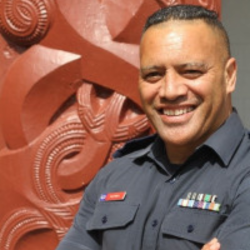 |
How did you get involved in kapa haka?
I got involved in kapa haka at boarding school but when I joined the Air Force I wanted to keep in contact with all things Māori so a group of us got together for kapa haka. We ended up performing for a lot of important events for the Air Force including supporting dignitaries and coming up with the haka for the Air Force which is still used today. Things progressed from there really.
Tell us a bit about your current kapa?
Te Tini o Rēhua was established in 2017 and we represent the Rangitāne rohe. We’re affiliated with Parewahawaha/Māirikiri marae.
Our group has some young people and it’s been great to see their energy. The biggest difference I’ve noticed is the rangatahi coming through. They all grew up with haka and it makes me excited to see where they will take it and what kapa haka will be like in 20 years’ time.
How much time goes into a performance?
We started training about 8 months ago, and since then it’s been hours and hours of wānanga and noho to create the 25-minute performance.
How would you describe Te Matatini to people who have never been?
It’s almost like going to watch your super rugby team. People are so passionate about their kapa and the atmosphere is positive and energetic, there’s always waiata blasting somewhere. It’s also a great family day and a safe space for everybody, enjoying what te ao Māori has on offer.
 |
How to watch the performances
After an epic four days of performances Te Whānau-a-Apanui from Mātaatua were crowned Toa Whakaihuwaka, the overall winners of Te Matatini 2023, making it their third win it total.
If you’ve never witnessed a Te Matatini performance and want to see what the magic is about, you can view the performance of Te Whānau-a-Apanui here(external link) or by heading to ‘www.tvnz.co.nz’ and searching “Whānau-a-Apanui”. All the performances including Hōri’s group Te Tini o Rēhua can be found via this link as well(external link).
Te Matatini takes place every two years and is hosted by a different rohe each time. Preparations are already underway for Te Matatini 2025 which will next be hosted by Aotea in Taranaki. Kua rite rānei koe e Hōri?
 |
 |
 |
Glossary | Kuputaka
- Te Matatini - From 1972 the event was known as the “Polynesian Festival” and was renamed in 2004 to Te Matatini meaning The Many Faces.
- Kapa haka - Performance group. Kapa - group, Haka - performance
- Tāmaki Makaurau - Auckland
- Toa Whakaihuwaka - Winning group. Toa - to be victorious, Whakaihuwaka - champions
- Motu - Country
- Kaihaka - Performers
- Kaimahi- Staff
- Te Rōpū - The Group. A group of our people in Te Hiku who are passionate about supporting and raising the profile of all things Māori for their region.
- Whakawhanaungatanga - One of our organisation’s values representing relationships and connections.
- Rangatahi – Younger generation or youth
- Wānanga - Discussions
- Noho – a colloquial term for staying somewhere, usually on marae
- Rohe – Region
- Kua rite rānei koe e Hōri? - Are you ready Hōri?
